An Analysis of Ethical Frameworks and Misconduct in the Finance Sector
VerifiedAdded on 2022/08/24
|16
|4187
|84
Report
AI Summary
This report delves into the ethical frameworks and prevalent issues within the financial sectors, particularly focusing on the Australian context and the role of the Financial Adviser Standards and Ethics Authority (FASEA). The report identifies and analyzes several key ethical concerns, including misleading statements regarding performance, security, and product features; failures in disclosing conflicts of interest; and the provision of inappropriate advice that does not align with client objectives. The discussion section explores the implications of these issues, emphasizing the importance of ethical conduct and compliance with FASEA standards. Specific examples of misconduct are highlighted, such as advisors misleading clients about investment risks and failing to disclose commissions. The report underscores the negative impacts of unethical practices on the financial sector and the need for adherence to ethical codes to maintain client trust and financial stability.
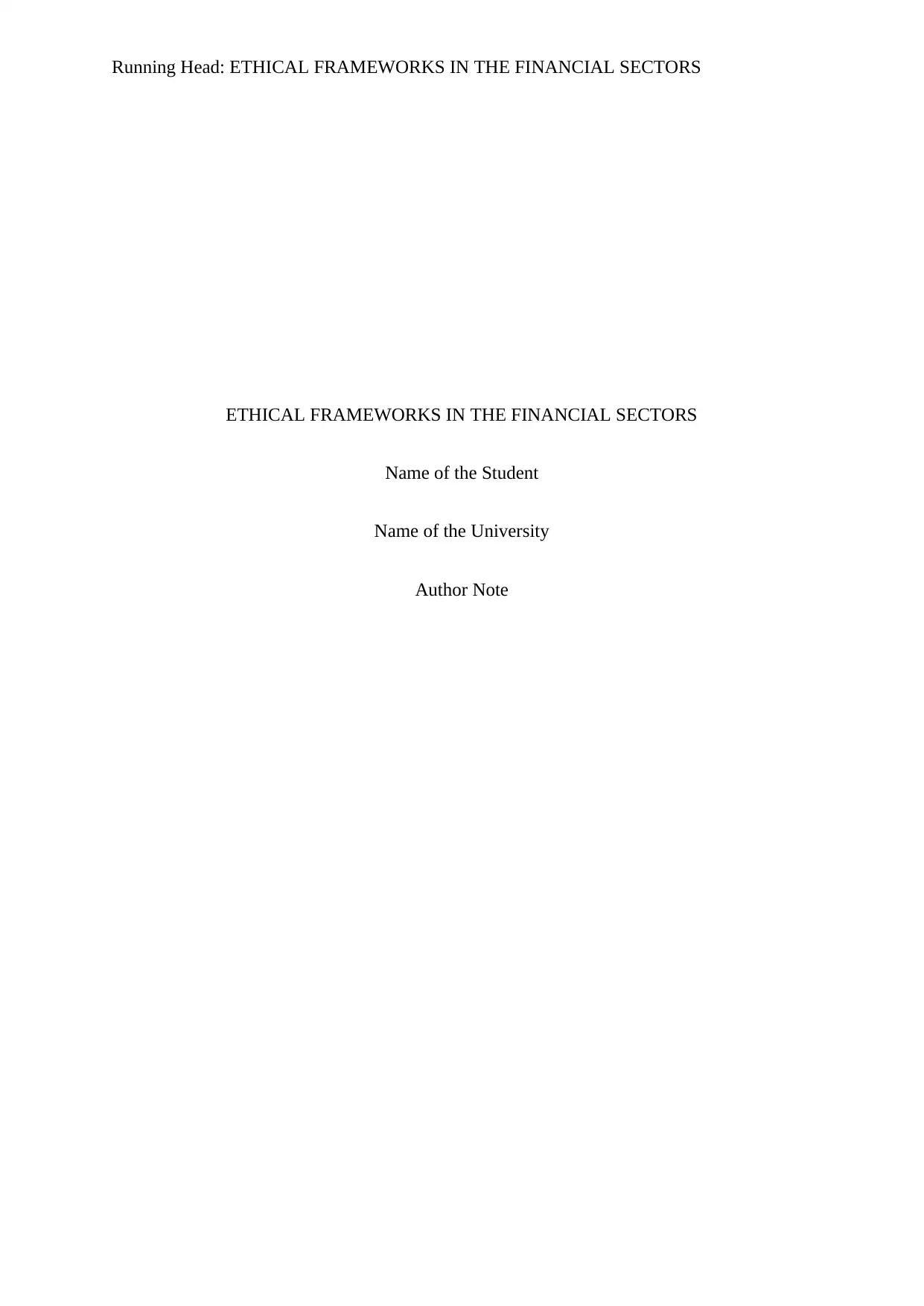
Running Head: ETHICAL FRAMEWORKS IN THE FINANCIAL SECTORS
ETHICAL FRAMEWORKS IN THE FINANCIAL SECTORS
Name of the Student
Name of the University
Author Note
ETHICAL FRAMEWORKS IN THE FINANCIAL SECTORS
Name of the Student
Name of the University
Author Note
Paraphrase This Document
Need a fresh take? Get an instant paraphrase of this document with our AI Paraphraser
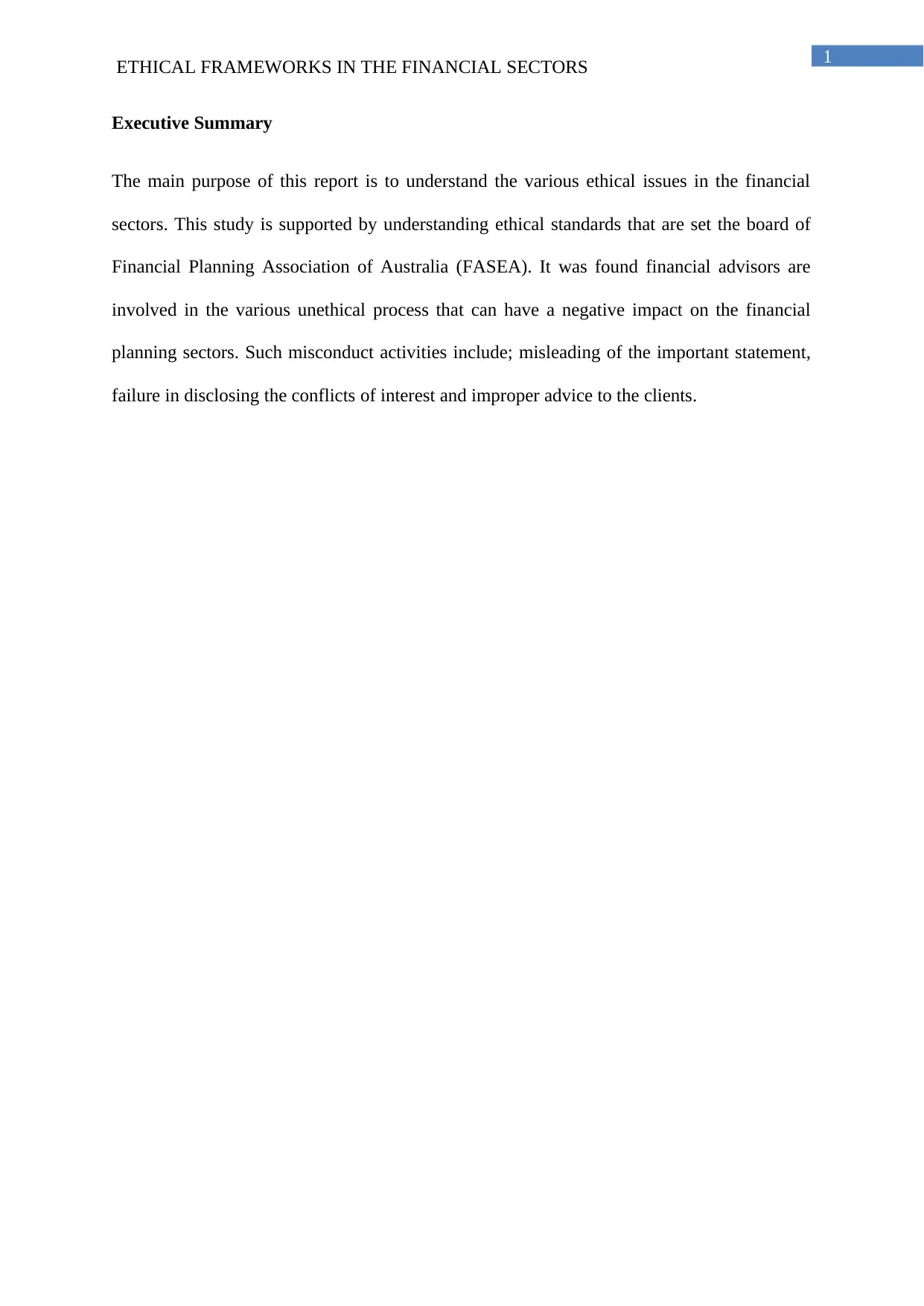
1
ETHICAL FRAMEWORKS IN THE FINANCIAL SECTORS
Executive Summary
The main purpose of this report is to understand the various ethical issues in the financial
sectors. This study is supported by understanding ethical standards that are set the board of
Financial Planning Association of Australia (FASEA). It was found financial advisors are
involved in the various unethical process that can have a negative impact on the financial
planning sectors. Such misconduct activities include; misleading of the important statement,
failure in disclosing the conflicts of interest and improper advice to the clients.
ETHICAL FRAMEWORKS IN THE FINANCIAL SECTORS
Executive Summary
The main purpose of this report is to understand the various ethical issues in the financial
sectors. This study is supported by understanding ethical standards that are set the board of
Financial Planning Association of Australia (FASEA). It was found financial advisors are
involved in the various unethical process that can have a negative impact on the financial
planning sectors. Such misconduct activities include; misleading of the important statement,
failure in disclosing the conflicts of interest and improper advice to the clients.
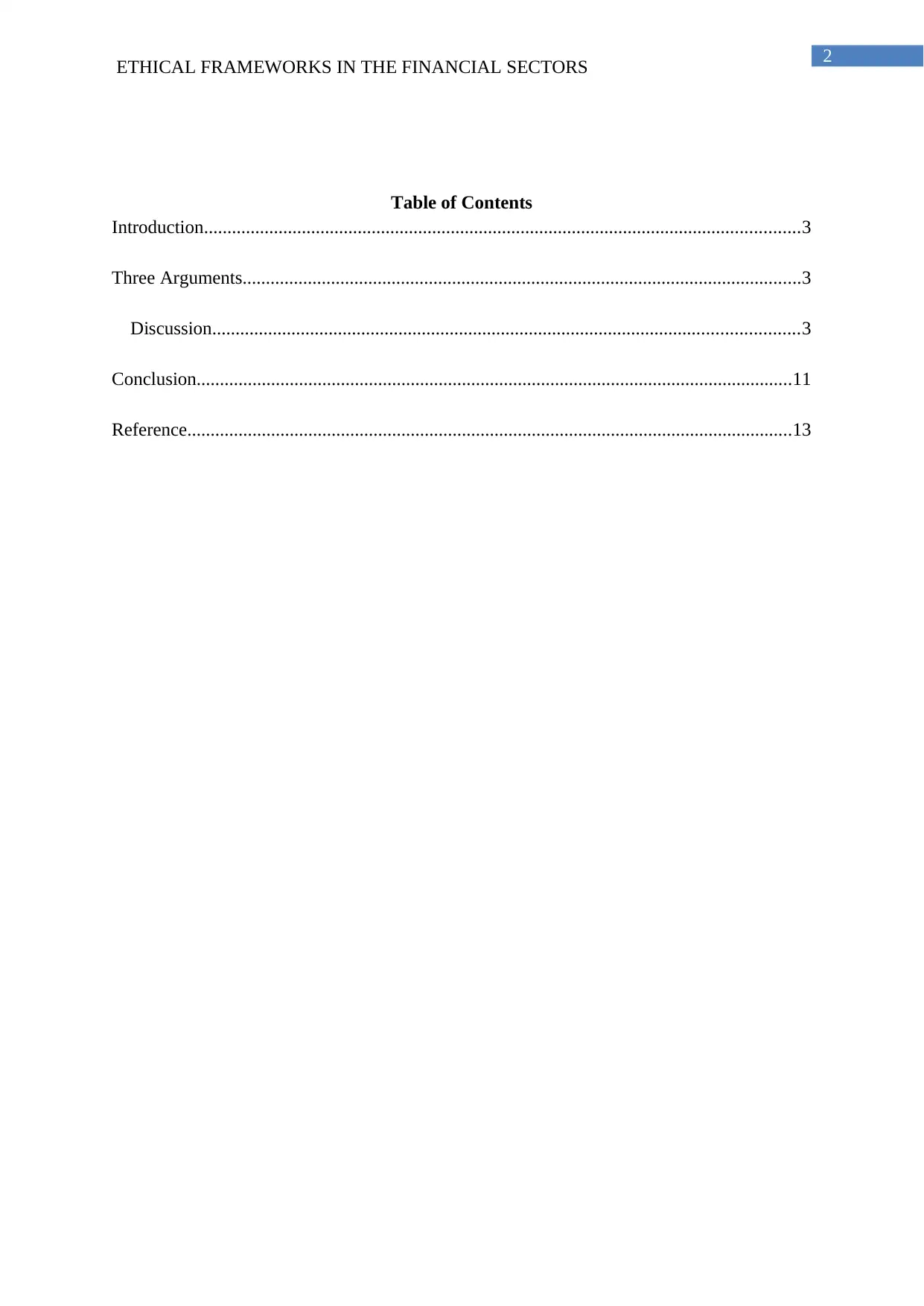
2
ETHICAL FRAMEWORKS IN THE FINANCIAL SECTORS
Table of Contents
Introduction................................................................................................................................3
Three Arguments........................................................................................................................3
Discussion..............................................................................................................................3
Conclusion................................................................................................................................11
Reference..................................................................................................................................13
ETHICAL FRAMEWORKS IN THE FINANCIAL SECTORS
Table of Contents
Introduction................................................................................................................................3
Three Arguments........................................................................................................................3
Discussion..............................................................................................................................3
Conclusion................................................................................................................................11
Reference..................................................................................................................................13
⊘ This is a preview!⊘
Do you want full access?
Subscribe today to unlock all pages.

Trusted by 1+ million students worldwide
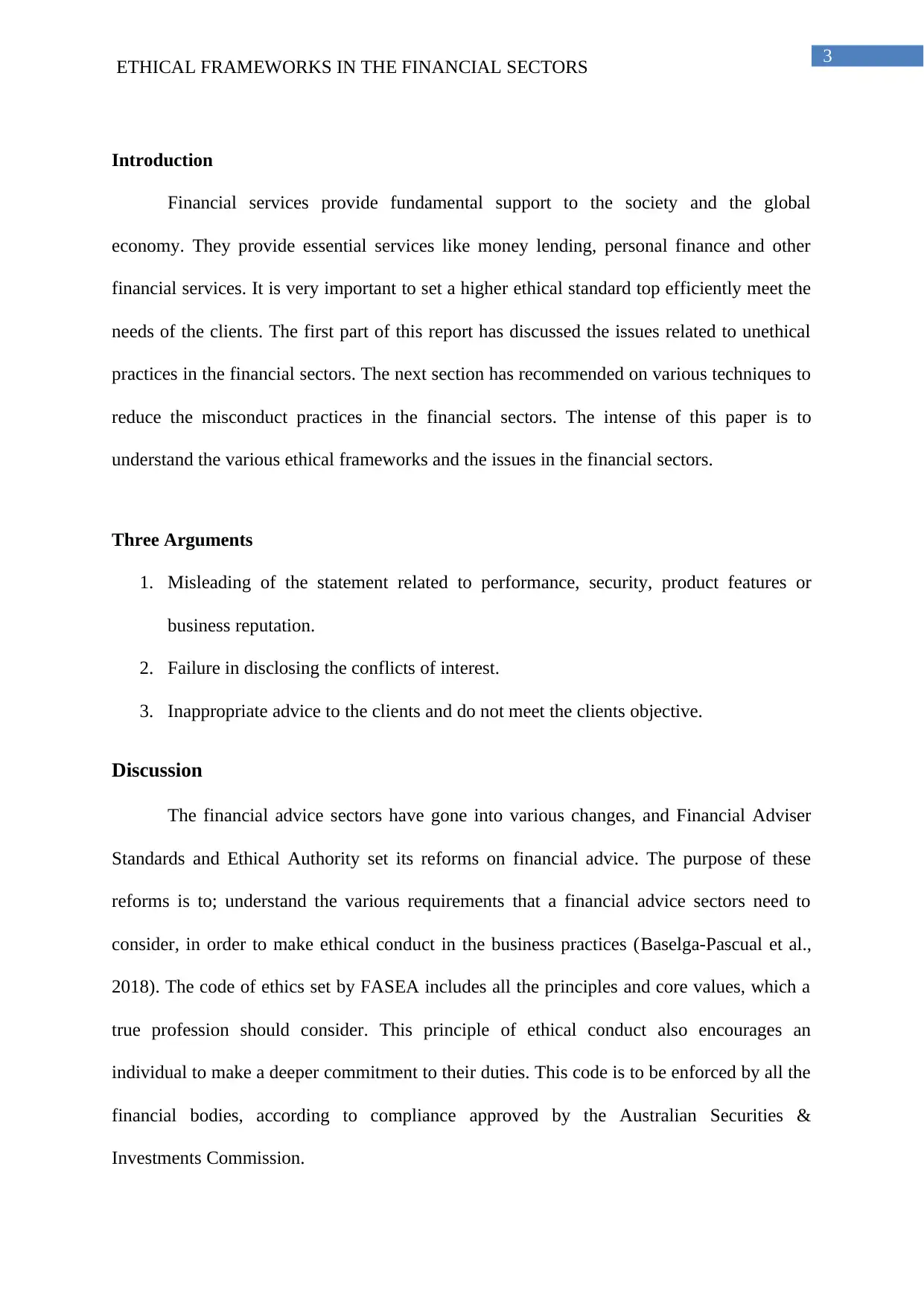
3
ETHICAL FRAMEWORKS IN THE FINANCIAL SECTORS
Introduction
Financial services provide fundamental support to the society and the global
economy. They provide essential services like money lending, personal finance and other
financial services. It is very important to set a higher ethical standard top efficiently meet the
needs of the clients. The first part of this report has discussed the issues related to unethical
practices in the financial sectors. The next section has recommended on various techniques to
reduce the misconduct practices in the financial sectors. The intense of this paper is to
understand the various ethical frameworks and the issues in the financial sectors.
Three Arguments
1. Misleading of the statement related to performance, security, product features or
business reputation.
2. Failure in disclosing the conflicts of interest.
3. Inappropriate advice to the clients and do not meet the clients objective.
Discussion
The financial advice sectors have gone into various changes, and Financial Adviser
Standards and Ethical Authority set its reforms on financial advice. The purpose of these
reforms is to; understand the various requirements that a financial advice sectors need to
consider, in order to make ethical conduct in the business practices (Baselga-Pascual et al.,
2018). The code of ethics set by FASEA includes all the principles and core values, which a
true profession should consider. This principle of ethical conduct also encourages an
individual to make a deeper commitment to their duties. This code is to be enforced by all the
financial bodies, according to compliance approved by the Australian Securities &
Investments Commission.
ETHICAL FRAMEWORKS IN THE FINANCIAL SECTORS
Introduction
Financial services provide fundamental support to the society and the global
economy. They provide essential services like money lending, personal finance and other
financial services. It is very important to set a higher ethical standard top efficiently meet the
needs of the clients. The first part of this report has discussed the issues related to unethical
practices in the financial sectors. The next section has recommended on various techniques to
reduce the misconduct practices in the financial sectors. The intense of this paper is to
understand the various ethical frameworks and the issues in the financial sectors.
Three Arguments
1. Misleading of the statement related to performance, security, product features or
business reputation.
2. Failure in disclosing the conflicts of interest.
3. Inappropriate advice to the clients and do not meet the clients objective.
Discussion
The financial advice sectors have gone into various changes, and Financial Adviser
Standards and Ethical Authority set its reforms on financial advice. The purpose of these
reforms is to; understand the various requirements that a financial advice sectors need to
consider, in order to make ethical conduct in the business practices (Baselga-Pascual et al.,
2018). The code of ethics set by FASEA includes all the principles and core values, which a
true profession should consider. This principle of ethical conduct also encourages an
individual to make a deeper commitment to their duties. This code is to be enforced by all the
financial bodies, according to compliance approved by the Australian Securities &
Investments Commission.
Paraphrase This Document
Need a fresh take? Get an instant paraphrase of this document with our AI Paraphraser
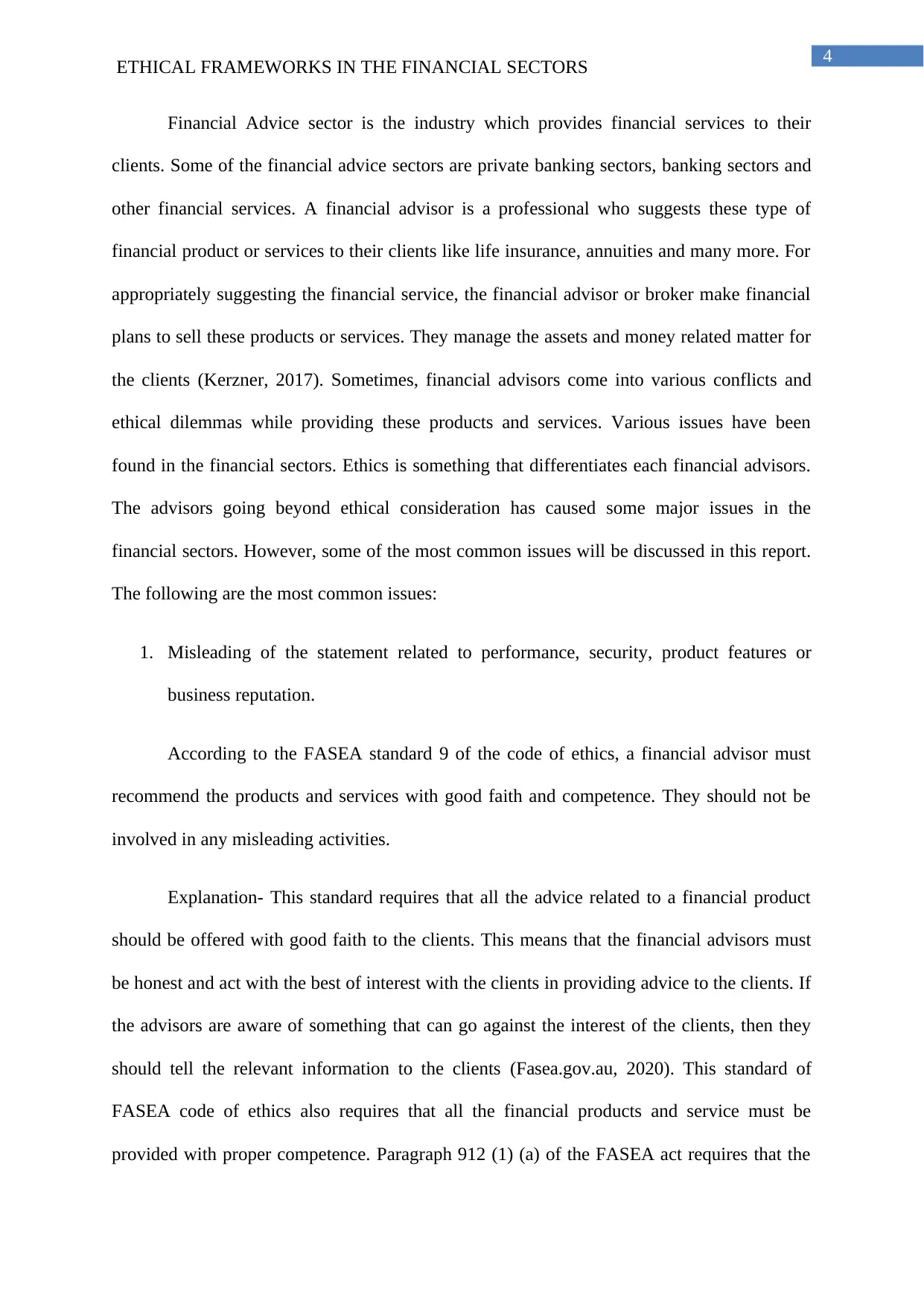
4
ETHICAL FRAMEWORKS IN THE FINANCIAL SECTORS
Financial Advice sector is the industry which provides financial services to their
clients. Some of the financial advice sectors are private banking sectors, banking sectors and
other financial services. A financial advisor is a professional who suggests these type of
financial product or services to their clients like life insurance, annuities and many more. For
appropriately suggesting the financial service, the financial advisor or broker make financial
plans to sell these products or services. They manage the assets and money related matter for
the clients (Kerzner, 2017). Sometimes, financial advisors come into various conflicts and
ethical dilemmas while providing these products and services. Various issues have been
found in the financial sectors. Ethics is something that differentiates each financial advisors.
The advisors going beyond ethical consideration has caused some major issues in the
financial sectors. However, some of the most common issues will be discussed in this report.
The following are the most common issues:
1. Misleading of the statement related to performance, security, product features or
business reputation.
According to the FASEA standard 9 of the code of ethics, a financial advisor must
recommend the products and services with good faith and competence. They should not be
involved in any misleading activities.
Explanation- This standard requires that all the advice related to a financial product
should be offered with good faith to the clients. This means that the financial advisors must
be honest and act with the best of interest with the clients in providing advice to the clients. If
the advisors are aware of something that can go against the interest of the clients, then they
should tell the relevant information to the clients (Fasea.gov.au, 2020). This standard of
FASEA code of ethics also requires that all the financial products and service must be
provided with proper competence. Paragraph 912 (1) (a) of the FASEA act requires that the
ETHICAL FRAMEWORKS IN THE FINANCIAL SECTORS
Financial Advice sector is the industry which provides financial services to their
clients. Some of the financial advice sectors are private banking sectors, banking sectors and
other financial services. A financial advisor is a professional who suggests these type of
financial product or services to their clients like life insurance, annuities and many more. For
appropriately suggesting the financial service, the financial advisor or broker make financial
plans to sell these products or services. They manage the assets and money related matter for
the clients (Kerzner, 2017). Sometimes, financial advisors come into various conflicts and
ethical dilemmas while providing these products and services. Various issues have been
found in the financial sectors. Ethics is something that differentiates each financial advisors.
The advisors going beyond ethical consideration has caused some major issues in the
financial sectors. However, some of the most common issues will be discussed in this report.
The following are the most common issues:
1. Misleading of the statement related to performance, security, product features or
business reputation.
According to the FASEA standard 9 of the code of ethics, a financial advisor must
recommend the products and services with good faith and competence. They should not be
involved in any misleading activities.
Explanation- This standard requires that all the advice related to a financial product
should be offered with good faith to the clients. This means that the financial advisors must
be honest and act with the best of interest with the clients in providing advice to the clients. If
the advisors are aware of something that can go against the interest of the clients, then they
should tell the relevant information to the clients (Fasea.gov.au, 2020). This standard of
FASEA code of ethics also requires that all the financial products and service must be
provided with proper competence. Paragraph 912 (1) (a) of the FASEA act requires that the
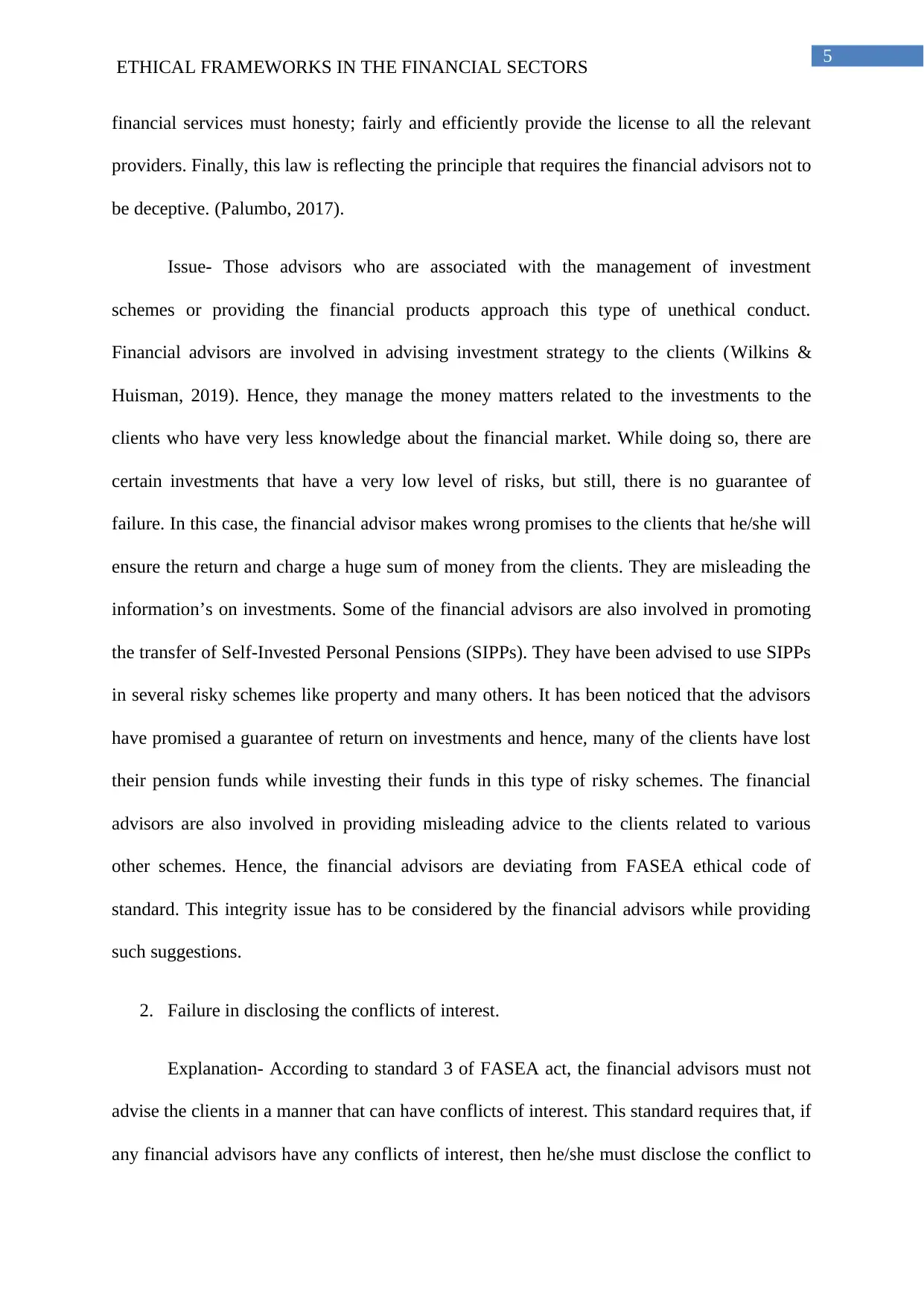
5
ETHICAL FRAMEWORKS IN THE FINANCIAL SECTORS
financial services must honesty; fairly and efficiently provide the license to all the relevant
providers. Finally, this law is reflecting the principle that requires the financial advisors not to
be deceptive. (Palumbo, 2017).
Issue- Those advisors who are associated with the management of investment
schemes or providing the financial products approach this type of unethical conduct.
Financial advisors are involved in advising investment strategy to the clients (Wilkins &
Huisman, 2019). Hence, they manage the money matters related to the investments to the
clients who have very less knowledge about the financial market. While doing so, there are
certain investments that have a very low level of risks, but still, there is no guarantee of
failure. In this case, the financial advisor makes wrong promises to the clients that he/she will
ensure the return and charge a huge sum of money from the clients. They are misleading the
information’s on investments. Some of the financial advisors are also involved in promoting
the transfer of Self-Invested Personal Pensions (SIPPs). They have been advised to use SIPPs
in several risky schemes like property and many others. It has been noticed that the advisors
have promised a guarantee of return on investments and hence, many of the clients have lost
their pension funds while investing their funds in this type of risky schemes. The financial
advisors are also involved in providing misleading advice to the clients related to various
other schemes. Hence, the financial advisors are deviating from FASEA ethical code of
standard. This integrity issue has to be considered by the financial advisors while providing
such suggestions.
2. Failure in disclosing the conflicts of interest.
Explanation- According to standard 3 of FASEA act, the financial advisors must not
advise the clients in a manner that can have conflicts of interest. This standard requires that, if
any financial advisors have any conflicts of interest, then he/she must disclose the conflict to
ETHICAL FRAMEWORKS IN THE FINANCIAL SECTORS
financial services must honesty; fairly and efficiently provide the license to all the relevant
providers. Finally, this law is reflecting the principle that requires the financial advisors not to
be deceptive. (Palumbo, 2017).
Issue- Those advisors who are associated with the management of investment
schemes or providing the financial products approach this type of unethical conduct.
Financial advisors are involved in advising investment strategy to the clients (Wilkins &
Huisman, 2019). Hence, they manage the money matters related to the investments to the
clients who have very less knowledge about the financial market. While doing so, there are
certain investments that have a very low level of risks, but still, there is no guarantee of
failure. In this case, the financial advisor makes wrong promises to the clients that he/she will
ensure the return and charge a huge sum of money from the clients. They are misleading the
information’s on investments. Some of the financial advisors are also involved in promoting
the transfer of Self-Invested Personal Pensions (SIPPs). They have been advised to use SIPPs
in several risky schemes like property and many others. It has been noticed that the advisors
have promised a guarantee of return on investments and hence, many of the clients have lost
their pension funds while investing their funds in this type of risky schemes. The financial
advisors are also involved in providing misleading advice to the clients related to various
other schemes. Hence, the financial advisors are deviating from FASEA ethical code of
standard. This integrity issue has to be considered by the financial advisors while providing
such suggestions.
2. Failure in disclosing the conflicts of interest.
Explanation- According to standard 3 of FASEA act, the financial advisors must not
advise the clients in a manner that can have conflicts of interest. This standard requires that, if
any financial advisors have any conflicts of interest, then he/she must disclose the conflict to
⊘ This is a preview!⊘
Do you want full access?
Subscribe today to unlock all pages.

Trusted by 1+ million students worldwide
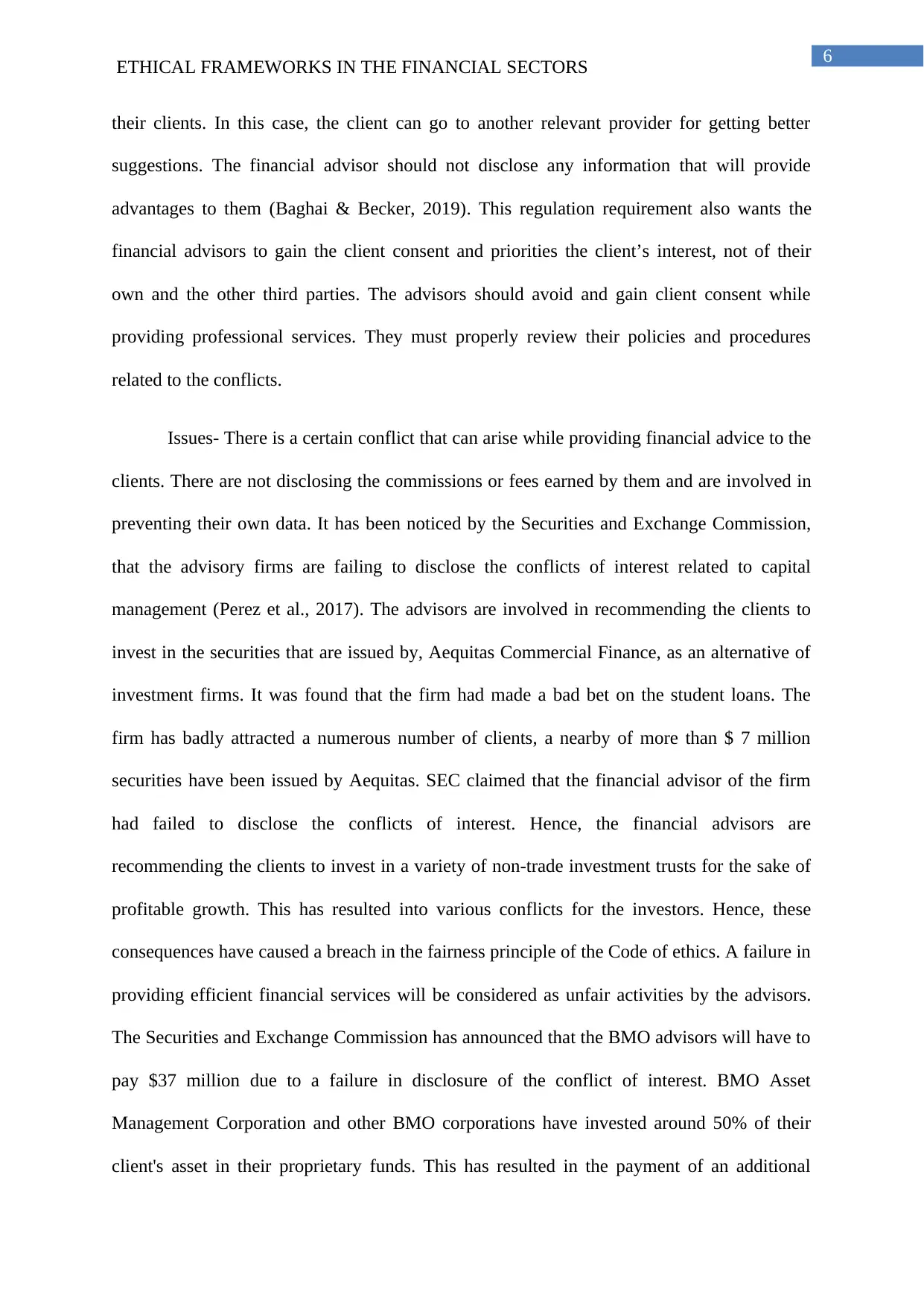
6
ETHICAL FRAMEWORKS IN THE FINANCIAL SECTORS
their clients. In this case, the client can go to another relevant provider for getting better
suggestions. The financial advisor should not disclose any information that will provide
advantages to them (Baghai & Becker, 2019). This regulation requirement also wants the
financial advisors to gain the client consent and priorities the client’s interest, not of their
own and the other third parties. The advisors should avoid and gain client consent while
providing professional services. They must properly review their policies and procedures
related to the conflicts.
Issues- There is a certain conflict that can arise while providing financial advice to the
clients. There are not disclosing the commissions or fees earned by them and are involved in
preventing their own data. It has been noticed by the Securities and Exchange Commission,
that the advisory firms are failing to disclose the conflicts of interest related to capital
management (Perez et al., 2017). The advisors are involved in recommending the clients to
invest in the securities that are issued by, Aequitas Commercial Finance, as an alternative of
investment firms. It was found that the firm had made a bad bet on the student loans. The
firm has badly attracted a numerous number of clients, a nearby of more than $ 7 million
securities have been issued by Aequitas. SEC claimed that the financial advisor of the firm
had failed to disclose the conflicts of interest. Hence, the financial advisors are
recommending the clients to invest in a variety of non-trade investment trusts for the sake of
profitable growth. This has resulted into various conflicts for the investors. Hence, these
consequences have caused a breach in the fairness principle of the Code of ethics. A failure in
providing efficient financial services will be considered as unfair activities by the advisors.
The Securities and Exchange Commission has announced that the BMO advisors will have to
pay $37 million due to a failure in disclosure of the conflict of interest. BMO Asset
Management Corporation and other BMO corporations have invested around 50% of their
client's asset in their proprietary funds. This has resulted in the payment of an additional
ETHICAL FRAMEWORKS IN THE FINANCIAL SECTORS
their clients. In this case, the client can go to another relevant provider for getting better
suggestions. The financial advisor should not disclose any information that will provide
advantages to them (Baghai & Becker, 2019). This regulation requirement also wants the
financial advisors to gain the client consent and priorities the client’s interest, not of their
own and the other third parties. The advisors should avoid and gain client consent while
providing professional services. They must properly review their policies and procedures
related to the conflicts.
Issues- There is a certain conflict that can arise while providing financial advice to the
clients. There are not disclosing the commissions or fees earned by them and are involved in
preventing their own data. It has been noticed by the Securities and Exchange Commission,
that the advisory firms are failing to disclose the conflicts of interest related to capital
management (Perez et al., 2017). The advisors are involved in recommending the clients to
invest in the securities that are issued by, Aequitas Commercial Finance, as an alternative of
investment firms. It was found that the firm had made a bad bet on the student loans. The
firm has badly attracted a numerous number of clients, a nearby of more than $ 7 million
securities have been issued by Aequitas. SEC claimed that the financial advisor of the firm
had failed to disclose the conflicts of interest. Hence, the financial advisors are
recommending the clients to invest in a variety of non-trade investment trusts for the sake of
profitable growth. This has resulted into various conflicts for the investors. Hence, these
consequences have caused a breach in the fairness principle of the Code of ethics. A failure in
providing efficient financial services will be considered as unfair activities by the advisors.
The Securities and Exchange Commission has announced that the BMO advisors will have to
pay $37 million due to a failure in disclosure of the conflict of interest. BMO Asset
Management Corporation and other BMO corporations have invested around 50% of their
client's asset in their proprietary funds. This has resulted in the payment of an additional
Paraphrase This Document
Need a fresh take? Get an instant paraphrase of this document with our AI Paraphraser
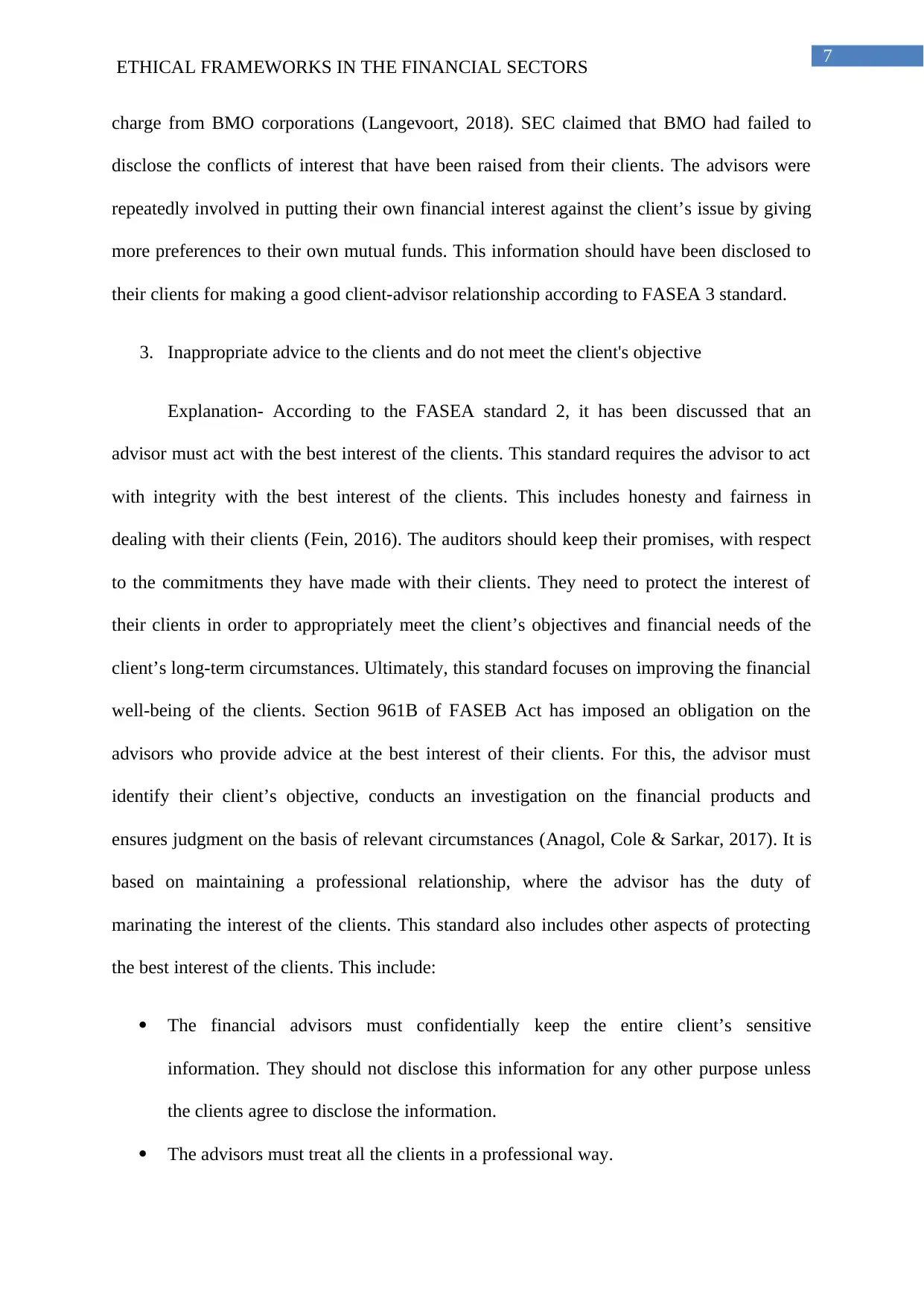
7
ETHICAL FRAMEWORKS IN THE FINANCIAL SECTORS
charge from BMO corporations (Langevoort, 2018). SEC claimed that BMO had failed to
disclose the conflicts of interest that have been raised from their clients. The advisors were
repeatedly involved in putting their own financial interest against the client’s issue by giving
more preferences to their own mutual funds. This information should have been disclosed to
their clients for making a good client-advisor relationship according to FASEA 3 standard.
3. Inappropriate advice to the clients and do not meet the client's objective
Explanation- According to the FASEA standard 2, it has been discussed that an
advisor must act with the best interest of the clients. This standard requires the advisor to act
with integrity with the best interest of the clients. This includes honesty and fairness in
dealing with their clients (Fein, 2016). The auditors should keep their promises, with respect
to the commitments they have made with their clients. They need to protect the interest of
their clients in order to appropriately meet the client’s objectives and financial needs of the
client’s long-term circumstances. Ultimately, this standard focuses on improving the financial
well-being of the clients. Section 961B of FASEB Act has imposed an obligation on the
advisors who provide advice at the best interest of their clients. For this, the advisor must
identify their client’s objective, conducts an investigation on the financial products and
ensures judgment on the basis of relevant circumstances (Anagol, Cole & Sarkar, 2017). It is
based on maintaining a professional relationship, where the advisor has the duty of
marinating the interest of the clients. This standard also includes other aspects of protecting
the best interest of the clients. This include:
The financial advisors must confidentially keep the entire client’s sensitive
information. They should not disclose this information for any other purpose unless
the clients agree to disclose the information.
The advisors must treat all the clients in a professional way.
ETHICAL FRAMEWORKS IN THE FINANCIAL SECTORS
charge from BMO corporations (Langevoort, 2018). SEC claimed that BMO had failed to
disclose the conflicts of interest that have been raised from their clients. The advisors were
repeatedly involved in putting their own financial interest against the client’s issue by giving
more preferences to their own mutual funds. This information should have been disclosed to
their clients for making a good client-advisor relationship according to FASEA 3 standard.
3. Inappropriate advice to the clients and do not meet the client's objective
Explanation- According to the FASEA standard 2, it has been discussed that an
advisor must act with the best interest of the clients. This standard requires the advisor to act
with integrity with the best interest of the clients. This includes honesty and fairness in
dealing with their clients (Fein, 2016). The auditors should keep their promises, with respect
to the commitments they have made with their clients. They need to protect the interest of
their clients in order to appropriately meet the client’s objectives and financial needs of the
client’s long-term circumstances. Ultimately, this standard focuses on improving the financial
well-being of the clients. Section 961B of FASEB Act has imposed an obligation on the
advisors who provide advice at the best interest of their clients. For this, the advisor must
identify their client’s objective, conducts an investigation on the financial products and
ensures judgment on the basis of relevant circumstances (Anagol, Cole & Sarkar, 2017). It is
based on maintaining a professional relationship, where the advisor has the duty of
marinating the interest of the clients. This standard also includes other aspects of protecting
the best interest of the clients. This include:
The financial advisors must confidentially keep the entire client’s sensitive
information. They should not disclose this information for any other purpose unless
the clients agree to disclose the information.
The advisors must treat all the clients in a professional way.
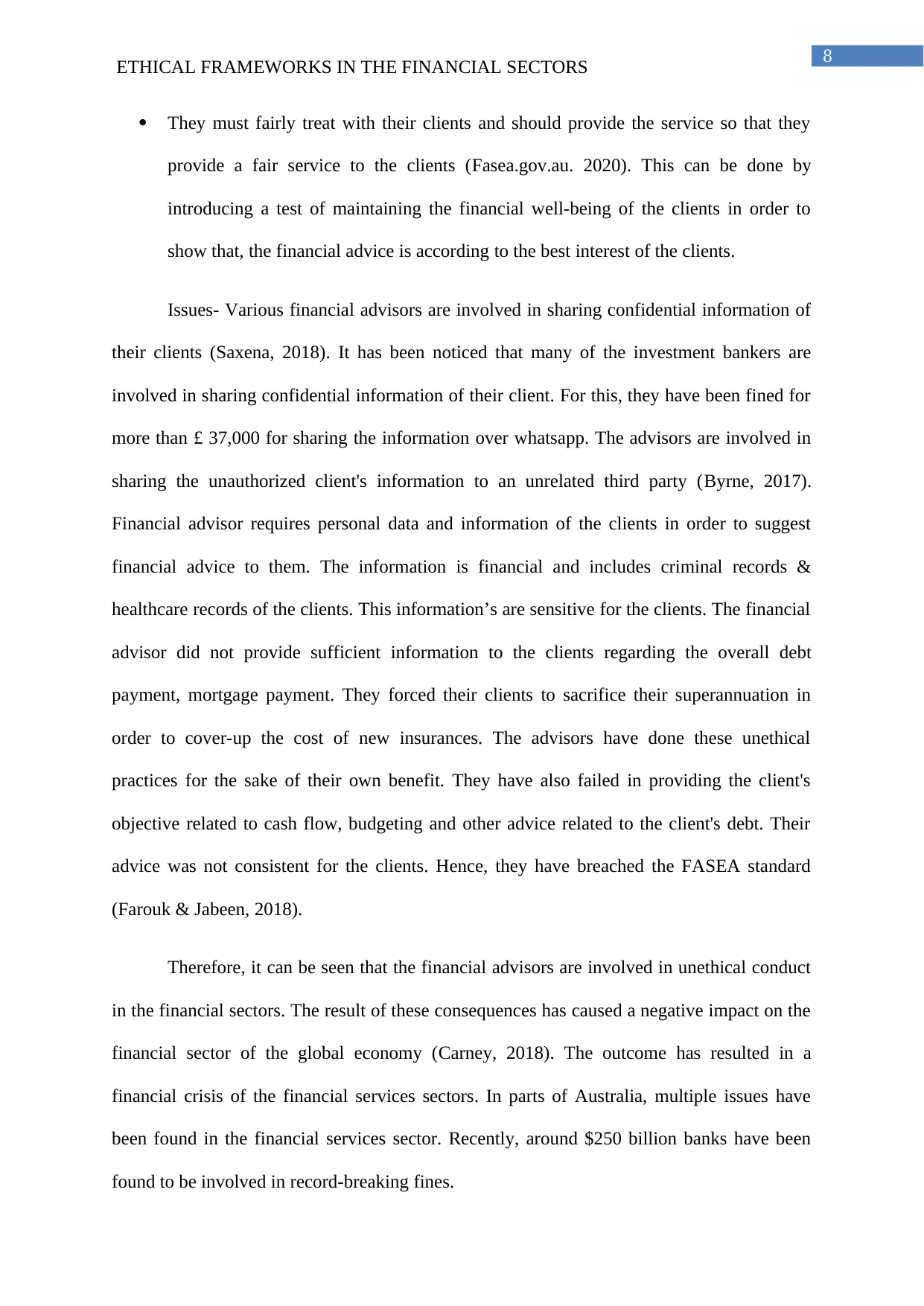
8
ETHICAL FRAMEWORKS IN THE FINANCIAL SECTORS
They must fairly treat with their clients and should provide the service so that they
provide a fair service to the clients (Fasea.gov.au. 2020). This can be done by
introducing a test of maintaining the financial well-being of the clients in order to
show that, the financial advice is according to the best interest of the clients.
Issues- Various financial advisors are involved in sharing confidential information of
their clients (Saxena, 2018). It has been noticed that many of the investment bankers are
involved in sharing confidential information of their client. For this, they have been fined for
more than £ 37,000 for sharing the information over whatsapp. The advisors are involved in
sharing the unauthorized client's information to an unrelated third party (Byrne, 2017).
Financial advisor requires personal data and information of the clients in order to suggest
financial advice to them. The information is financial and includes criminal records &
healthcare records of the clients. This information’s are sensitive for the clients. The financial
advisor did not provide sufficient information to the clients regarding the overall debt
payment, mortgage payment. They forced their clients to sacrifice their superannuation in
order to cover-up the cost of new insurances. The advisors have done these unethical
practices for the sake of their own benefit. They have also failed in providing the client's
objective related to cash flow, budgeting and other advice related to the client's debt. Their
advice was not consistent for the clients. Hence, they have breached the FASEA standard
(Farouk & Jabeen, 2018).
Therefore, it can be seen that the financial advisors are involved in unethical conduct
in the financial sectors. The result of these consequences has caused a negative impact on the
financial sector of the global economy (Carney, 2018). The outcome has resulted in a
financial crisis of the financial services sectors. In parts of Australia, multiple issues have
been found in the financial services sector. Recently, around $250 billion banks have been
found to be involved in record-breaking fines.
ETHICAL FRAMEWORKS IN THE FINANCIAL SECTORS
They must fairly treat with their clients and should provide the service so that they
provide a fair service to the clients (Fasea.gov.au. 2020). This can be done by
introducing a test of maintaining the financial well-being of the clients in order to
show that, the financial advice is according to the best interest of the clients.
Issues- Various financial advisors are involved in sharing confidential information of
their clients (Saxena, 2018). It has been noticed that many of the investment bankers are
involved in sharing confidential information of their client. For this, they have been fined for
more than £ 37,000 for sharing the information over whatsapp. The advisors are involved in
sharing the unauthorized client's information to an unrelated third party (Byrne, 2017).
Financial advisor requires personal data and information of the clients in order to suggest
financial advice to them. The information is financial and includes criminal records &
healthcare records of the clients. This information’s are sensitive for the clients. The financial
advisor did not provide sufficient information to the clients regarding the overall debt
payment, mortgage payment. They forced their clients to sacrifice their superannuation in
order to cover-up the cost of new insurances. The advisors have done these unethical
practices for the sake of their own benefit. They have also failed in providing the client's
objective related to cash flow, budgeting and other advice related to the client's debt. Their
advice was not consistent for the clients. Hence, they have breached the FASEA standard
(Farouk & Jabeen, 2018).
Therefore, it can be seen that the financial advisors are involved in unethical conduct
in the financial sectors. The result of these consequences has caused a negative impact on the
financial sector of the global economy (Carney, 2018). The outcome has resulted in a
financial crisis of the financial services sectors. In parts of Australia, multiple issues have
been found in the financial services sector. Recently, around $250 billion banks have been
found to be involved in record-breaking fines.
⊘ This is a preview!⊘
Do you want full access?
Subscribe today to unlock all pages.

Trusted by 1+ million students worldwide
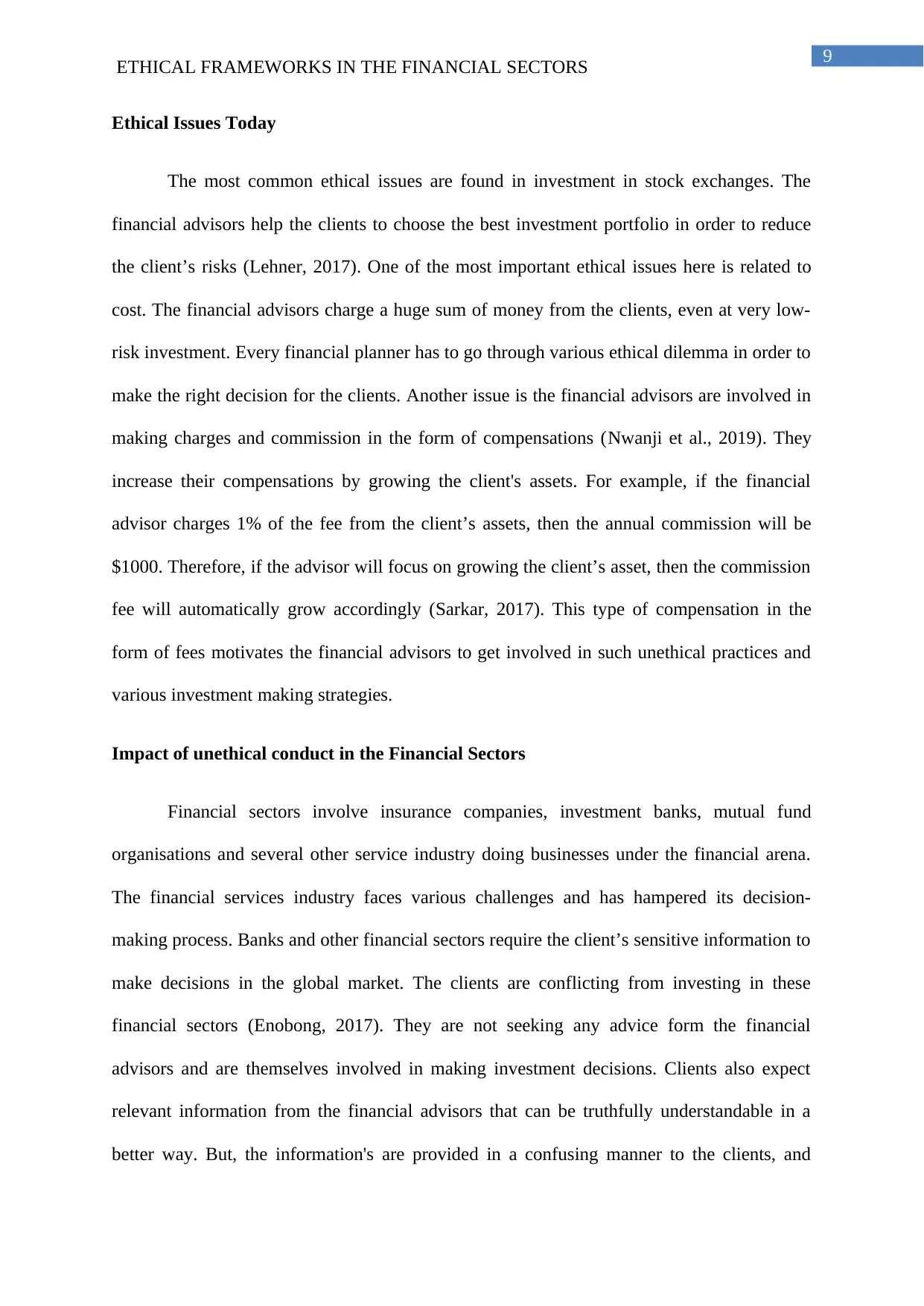
9
ETHICAL FRAMEWORKS IN THE FINANCIAL SECTORS
Ethical Issues Today
The most common ethical issues are found in investment in stock exchanges. The
financial advisors help the clients to choose the best investment portfolio in order to reduce
the client’s risks (Lehner, 2017). One of the most important ethical issues here is related to
cost. The financial advisors charge a huge sum of money from the clients, even at very low-
risk investment. Every financial planner has to go through various ethical dilemma in order to
make the right decision for the clients. Another issue is the financial advisors are involved in
making charges and commission in the form of compensations (Nwanji et al., 2019). They
increase their compensations by growing the client's assets. For example, if the financial
advisor charges 1% of the fee from the client’s assets, then the annual commission will be
$1000. Therefore, if the advisor will focus on growing the client’s asset, then the commission
fee will automatically grow accordingly (Sarkar, 2017). This type of compensation in the
form of fees motivates the financial advisors to get involved in such unethical practices and
various investment making strategies.
Impact of unethical conduct in the Financial Sectors
Financial sectors involve insurance companies, investment banks, mutual fund
organisations and several other service industry doing businesses under the financial arena.
The financial services industry faces various challenges and has hampered its decision-
making process. Banks and other financial sectors require the client’s sensitive information to
make decisions in the global market. The clients are conflicting from investing in these
financial sectors (Enobong, 2017). They are not seeking any advice form the financial
advisors and are themselves involved in making investment decisions. Clients also expect
relevant information from the financial advisors that can be truthfully understandable in a
better way. But, the information's are provided in a confusing manner to the clients, and
ETHICAL FRAMEWORKS IN THE FINANCIAL SECTORS
Ethical Issues Today
The most common ethical issues are found in investment in stock exchanges. The
financial advisors help the clients to choose the best investment portfolio in order to reduce
the client’s risks (Lehner, 2017). One of the most important ethical issues here is related to
cost. The financial advisors charge a huge sum of money from the clients, even at very low-
risk investment. Every financial planner has to go through various ethical dilemma in order to
make the right decision for the clients. Another issue is the financial advisors are involved in
making charges and commission in the form of compensations (Nwanji et al., 2019). They
increase their compensations by growing the client's assets. For example, if the financial
advisor charges 1% of the fee from the client’s assets, then the annual commission will be
$1000. Therefore, if the advisor will focus on growing the client’s asset, then the commission
fee will automatically grow accordingly (Sarkar, 2017). This type of compensation in the
form of fees motivates the financial advisors to get involved in such unethical practices and
various investment making strategies.
Impact of unethical conduct in the Financial Sectors
Financial sectors involve insurance companies, investment banks, mutual fund
organisations and several other service industry doing businesses under the financial arena.
The financial services industry faces various challenges and has hampered its decision-
making process. Banks and other financial sectors require the client’s sensitive information to
make decisions in the global market. The clients are conflicting from investing in these
financial sectors (Enobong, 2017). They are not seeking any advice form the financial
advisors and are themselves involved in making investment decisions. Clients also expect
relevant information from the financial advisors that can be truthfully understandable in a
better way. But, the information's are provided in a confusing manner to the clients, and
Paraphrase This Document
Need a fresh take? Get an instant paraphrase of this document with our AI Paraphraser
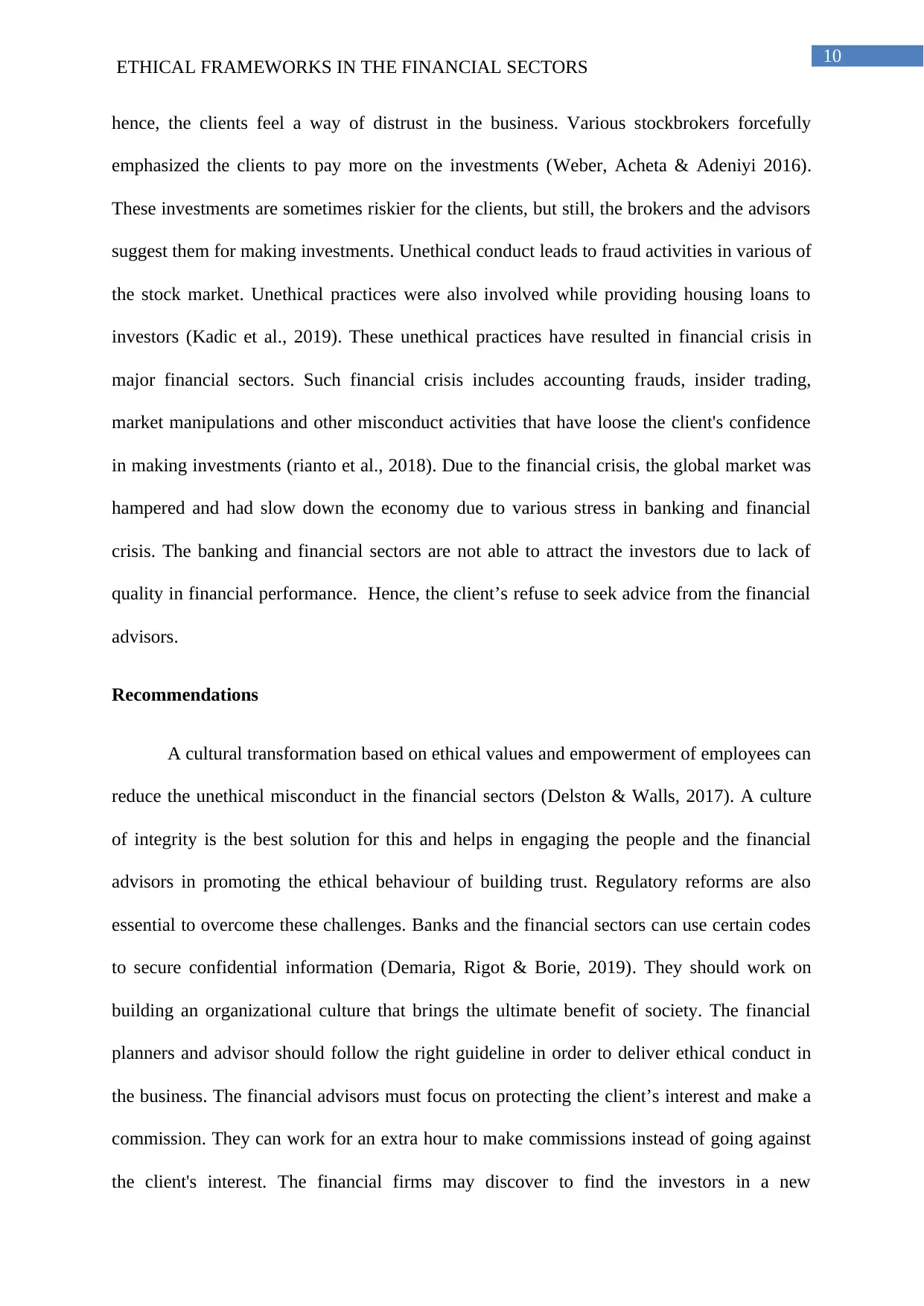
10
ETHICAL FRAMEWORKS IN THE FINANCIAL SECTORS
hence, the clients feel a way of distrust in the business. Various stockbrokers forcefully
emphasized the clients to pay more on the investments (Weber, Acheta & Adeniyi 2016).
These investments are sometimes riskier for the clients, but still, the brokers and the advisors
suggest them for making investments. Unethical conduct leads to fraud activities in various of
the stock market. Unethical practices were also involved while providing housing loans to
investors (Kadic et al., 2019). These unethical practices have resulted in financial crisis in
major financial sectors. Such financial crisis includes accounting frauds, insider trading,
market manipulations and other misconduct activities that have loose the client's confidence
in making investments (rianto et al., 2018). Due to the financial crisis, the global market was
hampered and had slow down the economy due to various stress in banking and financial
crisis. The banking and financial sectors are not able to attract the investors due to lack of
quality in financial performance. Hence, the client’s refuse to seek advice from the financial
advisors.
Recommendations
A cultural transformation based on ethical values and empowerment of employees can
reduce the unethical misconduct in the financial sectors (Delston & Walls, 2017). A culture
of integrity is the best solution for this and helps in engaging the people and the financial
advisors in promoting the ethical behaviour of building trust. Regulatory reforms are also
essential to overcome these challenges. Banks and the financial sectors can use certain codes
to secure confidential information (Demaria, Rigot & Borie, 2019). They should work on
building an organizational culture that brings the ultimate benefit of society. The financial
planners and advisor should follow the right guideline in order to deliver ethical conduct in
the business. The financial advisors must focus on protecting the client’s interest and make a
commission. They can work for an extra hour to make commissions instead of going against
the client's interest. The financial firms may discover to find the investors in a new
ETHICAL FRAMEWORKS IN THE FINANCIAL SECTORS
hence, the clients feel a way of distrust in the business. Various stockbrokers forcefully
emphasized the clients to pay more on the investments (Weber, Acheta & Adeniyi 2016).
These investments are sometimes riskier for the clients, but still, the brokers and the advisors
suggest them for making investments. Unethical conduct leads to fraud activities in various of
the stock market. Unethical practices were also involved while providing housing loans to
investors (Kadic et al., 2019). These unethical practices have resulted in financial crisis in
major financial sectors. Such financial crisis includes accounting frauds, insider trading,
market manipulations and other misconduct activities that have loose the client's confidence
in making investments (rianto et al., 2018). Due to the financial crisis, the global market was
hampered and had slow down the economy due to various stress in banking and financial
crisis. The banking and financial sectors are not able to attract the investors due to lack of
quality in financial performance. Hence, the client’s refuse to seek advice from the financial
advisors.
Recommendations
A cultural transformation based on ethical values and empowerment of employees can
reduce the unethical misconduct in the financial sectors (Delston & Walls, 2017). A culture
of integrity is the best solution for this and helps in engaging the people and the financial
advisors in promoting the ethical behaviour of building trust. Regulatory reforms are also
essential to overcome these challenges. Banks and the financial sectors can use certain codes
to secure confidential information (Demaria, Rigot & Borie, 2019). They should work on
building an organizational culture that brings the ultimate benefit of society. The financial
planners and advisor should follow the right guideline in order to deliver ethical conduct in
the business. The financial advisors must focus on protecting the client’s interest and make a
commission. They can work for an extra hour to make commissions instead of going against
the client's interest. The financial firms may discover to find the investors in a new
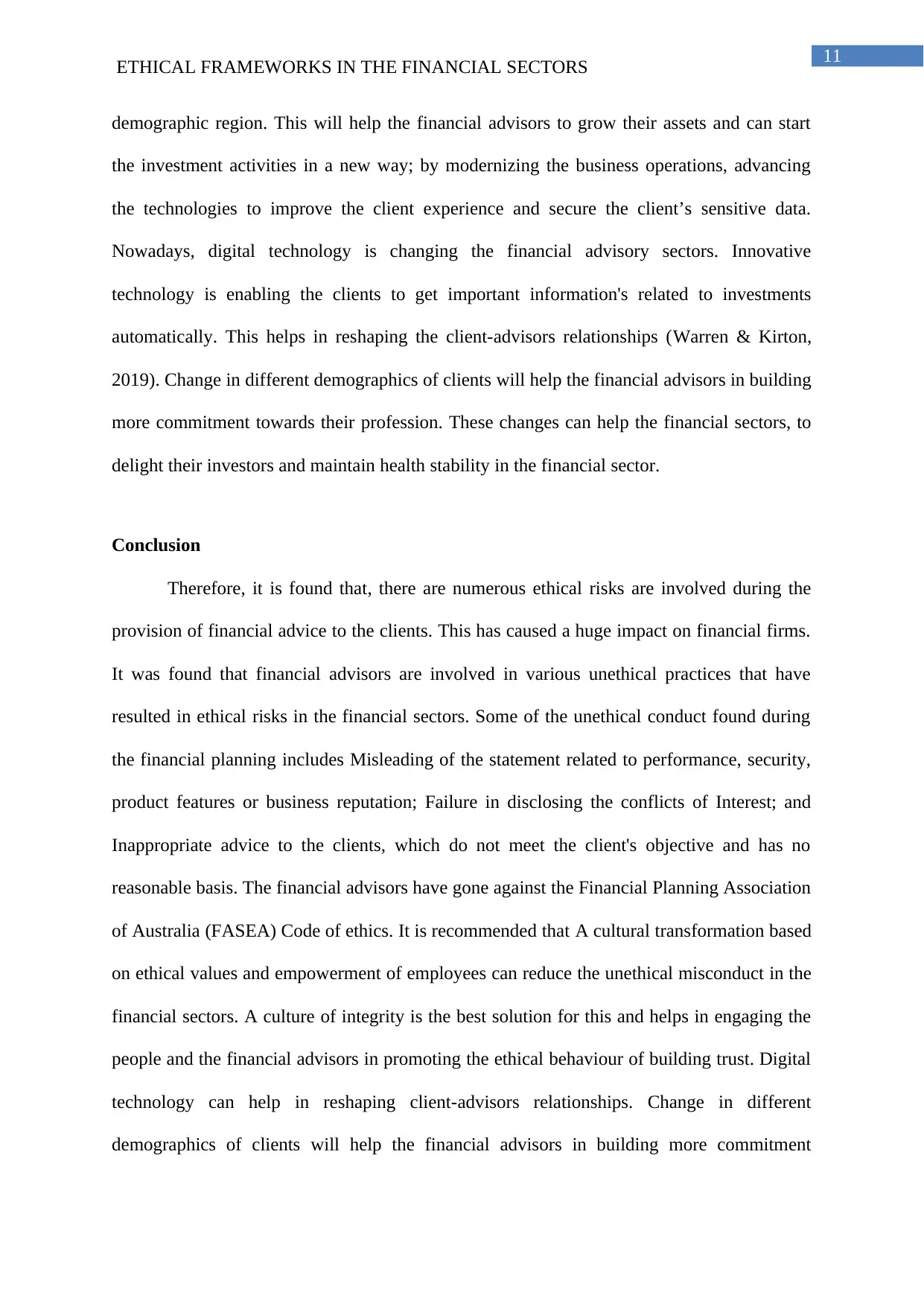
11
ETHICAL FRAMEWORKS IN THE FINANCIAL SECTORS
demographic region. This will help the financial advisors to grow their assets and can start
the investment activities in a new way; by modernizing the business operations, advancing
the technologies to improve the client experience and secure the client’s sensitive data.
Nowadays, digital technology is changing the financial advisory sectors. Innovative
technology is enabling the clients to get important information's related to investments
automatically. This helps in reshaping the client-advisors relationships (Warren & Kirton,
2019). Change in different demographics of clients will help the financial advisors in building
more commitment towards their profession. These changes can help the financial sectors, to
delight their investors and maintain health stability in the financial sector.
Conclusion
Therefore, it is found that, there are numerous ethical risks are involved during the
provision of financial advice to the clients. This has caused a huge impact on financial firms.
It was found that financial advisors are involved in various unethical practices that have
resulted in ethical risks in the financial sectors. Some of the unethical conduct found during
the financial planning includes Misleading of the statement related to performance, security,
product features or business reputation; Failure in disclosing the conflicts of Interest; and
Inappropriate advice to the clients, which do not meet the client's objective and has no
reasonable basis. The financial advisors have gone against the Financial Planning Association
of Australia (FASEA) Code of ethics. It is recommended that A cultural transformation based
on ethical values and empowerment of employees can reduce the unethical misconduct in the
financial sectors. A culture of integrity is the best solution for this and helps in engaging the
people and the financial advisors in promoting the ethical behaviour of building trust. Digital
technology can help in reshaping client-advisors relationships. Change in different
demographics of clients will help the financial advisors in building more commitment
ETHICAL FRAMEWORKS IN THE FINANCIAL SECTORS
demographic region. This will help the financial advisors to grow their assets and can start
the investment activities in a new way; by modernizing the business operations, advancing
the technologies to improve the client experience and secure the client’s sensitive data.
Nowadays, digital technology is changing the financial advisory sectors. Innovative
technology is enabling the clients to get important information's related to investments
automatically. This helps in reshaping the client-advisors relationships (Warren & Kirton,
2019). Change in different demographics of clients will help the financial advisors in building
more commitment towards their profession. These changes can help the financial sectors, to
delight their investors and maintain health stability in the financial sector.
Conclusion
Therefore, it is found that, there are numerous ethical risks are involved during the
provision of financial advice to the clients. This has caused a huge impact on financial firms.
It was found that financial advisors are involved in various unethical practices that have
resulted in ethical risks in the financial sectors. Some of the unethical conduct found during
the financial planning includes Misleading of the statement related to performance, security,
product features or business reputation; Failure in disclosing the conflicts of Interest; and
Inappropriate advice to the clients, which do not meet the client's objective and has no
reasonable basis. The financial advisors have gone against the Financial Planning Association
of Australia (FASEA) Code of ethics. It is recommended that A cultural transformation based
on ethical values and empowerment of employees can reduce the unethical misconduct in the
financial sectors. A culture of integrity is the best solution for this and helps in engaging the
people and the financial advisors in promoting the ethical behaviour of building trust. Digital
technology can help in reshaping client-advisors relationships. Change in different
demographics of clients will help the financial advisors in building more commitment
⊘ This is a preview!⊘
Do you want full access?
Subscribe today to unlock all pages.

Trusted by 1+ million students worldwide
1 out of 16
Related Documents
Your All-in-One AI-Powered Toolkit for Academic Success.
+13062052269
info@desklib.com
Available 24*7 on WhatsApp / Email
![[object Object]](/_next/static/media/star-bottom.7253800d.svg)
Unlock your academic potential
Copyright © 2020–2026 A2Z Services. All Rights Reserved. Developed and managed by ZUCOL.





